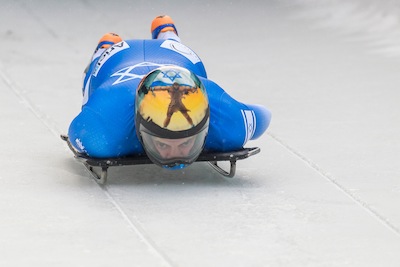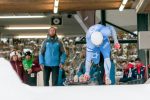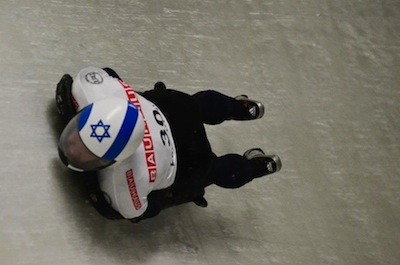When A.J. Edelman was training in Whistler, he was the guest cantor for Chabad of the North Shore’s Yom Kippur services. (photo from A.J. Edelman)
Chabad of the North Shore community members had a more personal reason to cheer on A.J. Edelman at the 2018 Winter Olympics in PyeongChang, South Korea. Israel’s only skeleton athlete to have made it to the Games, Edelman was training in Whistler around the High Holidays last year. While there, he participated in community life, stepping in as guest cantor on Yom Kippur.
“Although he [Edelman] could have attended services at a larger synagogue in Vancouver, he was committed to spending Yom Kippur where he could be useful and have an impact,” said Rabbi Mendy Mochkin, spiritual leader of Chabad of the North Shore. “We had a cantor during Rosh Hashanah, but not for Yom Kippur.
“It worked out great. Our community was very excited to learn that a skeleton athlete representing Israel was training locally and was very touched that he chose to join us. They were very moved by his … melodies and heartfelt prayers. We all prayed together with him that he should attain his dream to be an ambassador for Am Yisrael. Our prayers were answered!”
Edelman was born and raised in Boston, in a Modern Orthodox, Zionist family, and he attended an Orthodox Jewish day school. When he was 2, his parents strapped a pair of skates onto his feet. By 22, he was a good hockey player, but not good enough to become a professional.
“I decided that, if I wanted to continue doing sports, it had to be on a high, elite level that could really give a platform to whatever I would choose to do afterward,” Edelman told the Independent. “So, I decided to represent Israel, because it was going to be the only way I was going to do it. As it happened, as I was thinking about this, skeleton appeared on the TV for the team trials for the United States for Sochi. And I thought it looked like a terrific sport – eye-catching.”
For some athletes, they become good at a sport and then look for a country that will let them compete under its flag. In Edelman’s case, he was mainly spurred by the idea of representing Israel. Then, he began searching for a sport.
“It could certainly help me achieve my goal of inspiriting people,” said Edelman. “I didn’t know how difficult it was or how painful it was. I didn’t know how bad, at first, I would be at it. But, I did dive full on into it.”
Edelman had to go from zero to 100, so to speak, in less than four years. While many along the way tried to tell him his goal was unattainable, the naysayers only fueled his resolve to succeed.
“It’s not like swimming or other sports where you have to hit a time relative to previous Olympics times, you have to hit an absolute performance standard of world ranking in that specific year. It’s a quota system,” explained Edelman of skeleton.
Edelman had to become one of the top 30 skeleton athletes in the world in about 48 months. His last year of training was focused – with help from the other athletes on the Israeli skeleton team – on maximizing his point collection at competitions.
“Positioning Israel to be the beneficiary of one of 10 single-sled nations through points I accumulated through specifics results and races was important – and it involved a lot of mathematical calculation,” said Edelman.
Edelman finished 28 out of 30 at the Winter Olympics.

“Making the Games was an insane accomplishment in that we were the only ones who did it without any coaching,” said Edelman. “We had absolute zero coaching for the first two years of my journey…. It took a huge physical toll and mental toll, and a massive financial toll. So, yes, 28 out of 30, I was very pleased.”
Edelman learned the sport from YouTube videos, and fundraised the money he needed to participate in competitions, buy equipment, and cover hotel stays and training facility fees. As far as trying to compete at the next Olympics, Edelman said, while he’d like to do that, it’s just not feasible.
“The financial strain is insane – $40,000 a year,” he said. “And only about 40% of it was covered from over the last four years by sponsors, family, friends – and complete random strangers. Doing it for another cycle would be too much of a financial strain. And I think I’ve accomplished what I was looking to accomplish, and am able to remain involved in Israel’s sports and help the next generation achieve their goals. I now have that platform.”
Although Edelman was at the Games – or maybe because he was at the Games – he said he felt disconnected from the Olympics as a whole.
“I only saw my own thing,” he said. “Otherwise, the experience at the end, or during the competition, of representing Israel, it was an honour unparalleled to anything in my life. There were a few moments I felt like I could cherish forever – the thoughts and feeling that this is what it’s like to represent a country and how it feels to be that individual. It was absolutely terrific.”
Edelman said he is not sure about what might come next for him, but that he is aiming big. For now, he is focused on transitioning from being a full-time athlete back into normal life. But life will never be the same for him, now that he has proven his potential to himself.
“If you apply yourself so completely and fully, and you just dedicate yourself the most you can, a lot can be accomplished,” he said. “But, not everything … I am never going to be able to make the NBA.
“I don’t usually tell people anything is possible. I tell them what I learned in the streets – that no one can tell you what you can’t do, and that you shouldn’t let others’ opinions dictate what you can do.”
As far as his experience with the Jewish community while training in Whistler, Edelman said, “My Jewish heritage is everything to me. It’s the entire reason why I did this. This journey was terribly difficult – it was the Jewish heritage aspect of it that kept me going.
“I cannot tell you how many times I wanted to give up, quit or just take days off,” he admitted. “But, then I’d remember I was representing the entire Jewish and Israeli community. Every night before I went to bed, I’d thank God for allowing me to be what’s called a Kiddush Hashem [sanctifying God’s name by living by example, in a holy way]. This means being a positive role model for my community and that means everything to me.”
Edelman connects with Jewish communities wherever he goes, seeing himself as an ambassador of the Jewish state. So, for him, joining the North Shore Jewish community when he was training in Whistler was a foregone conclusion.
The 2019 World Championship will be held in Whistler and, although Edelman has retired from athletic life, he wants to attend.
“When I tried out,” recalled Edelman of his first skeleton trial, “the Israel scouting report said that if I could just get down the track, that would be it … that I wouldn’t make it to the Games no matter how hard I tried. I think everybody can have that kind of moment … when they think they can’t do something or are told they can’t do something – but they should absolutely try and expect success.”
Rebeca Kuropatwa is a Winnipeg freelance writer.



